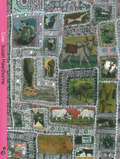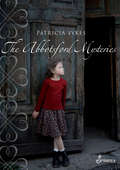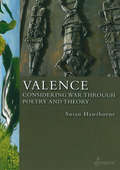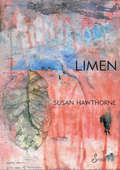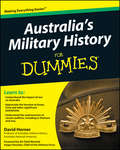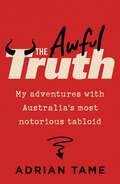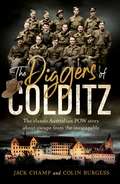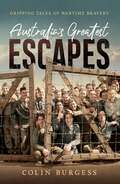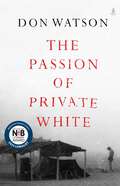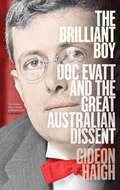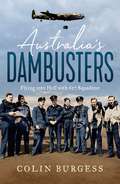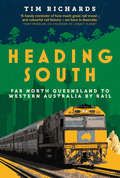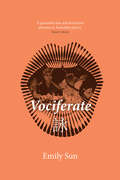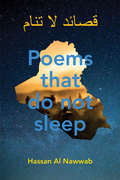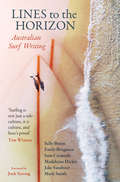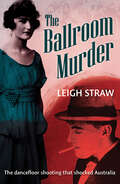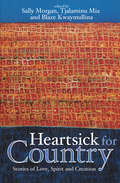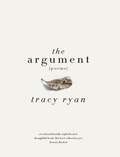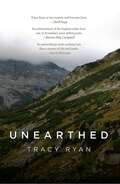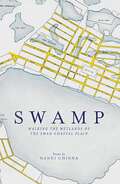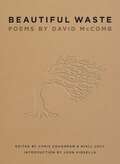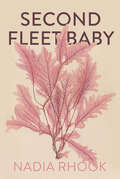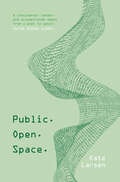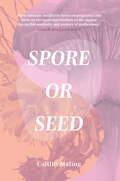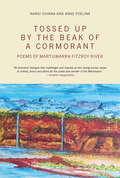- Table View
- List View
Cow
by Susan HawthorneAn intriguing approach to the rewriting of myth, this poetry collection journeys through the history of languages and symbolic traditions. Through main character Queenie, a cow of many abilities, these poems delve into the creation of the universe as Queenie fashions the galaxies and travels through the sky as a herd of stars. Delightful and surprising, this compilation draws on the Greek lyric tradition of Sappho as well as on South India's Sangam poetry tradition to provide a balanced work of both humor and melancholy.
The Abbotsford Mysteries
by Patricia SykesThe Abbotsford Convent becomes more than the setting of this poetry collection; it emerges as presence, intimate and familiar as well as constraining and forbidding. But, it is childhood itself that becomes the subterranean geography and pulse of this compilation as the poems explore what it means to grow up in an orphanage. Subject to the rules of lay and religious adults, the voices herein create multiple pathways through memory and time as they map and navigate the many-stranded mysteries of their institutionalized lives.
Valence: Considering War through Poetry and Theory
by Susan HawthorneValence in chemistry, the number of bonds in an element's atom in linguistics, the number of arguments controlled by a verbal predicate in psychology, the emotional charge something has In this remarkable annotated poem, Susan Hawthorne commits to words the horrors of war that have been left unspoken. She shatters the conspiracy of silence and dares to draw links between militarism, fundamentalism and the sex industry. She rails against the violence of war and contemplates the link between place and the history of war that is infused into the earth. With a fresh examination of her surroundings, she considers the endless cycle of war that survives on the persistence of hope--hope of an end to war, hope of an end to suffering. This is a hope that Susan Hawthorne does not ultimately share, but her courage in telling the truth about war through her poetry is a gift for readers.
Limen
by Susan HawthorneWhen two women and a dog set off on a holiday, they have no inkling of what's to come. They wake to find the river has crept up silently during the night. Trapped by floodwater, they devise escape routes only to be faced with more obstacles at every turn. Only the dog remains calm. This poetic novella grips you with its language, its pace, and its anxieties. The word limen is defined as "a threshold below which a stimulus is not perceived." In Susan's Hawthorne's verse novel, there is the threat of the rising waters--the women's safety is above the threshold of perception. This definition feeds the suspense and tension of this book. However, the word also suggests a transition, a state, a threshold between earth and sky, between day and night, between water and heat, survival and drowning--and it is these paired states, together with many more that also drive narrative.
Australia's Military History For Dummies (For Dummies Ser.)
by David HornerCreated especially for the Australian customer! The simple and easy way to get your mind around Australia's military history More people are visiting Gallipoli and walking the Kokoda Trail each year — now find out why. This complete guide helps you trace the story of Australia's involvement in war, from the colonial conflicts with the Indigenous population, through the World Wars to peacekeeping initiatives in East Timor and the controversial conflict in Afghanistan. Find out the origins of Australia's military history — go all the way back to the arrival of the First Fleet and the conflicts with the Indigenous peoples Learn about the heroism of the Anzacs — discover the origins of the legend of Gallipoli, and how the brass bungled the campaign Discover the horrors of war — consider the suffering and huge losses on the Western Front Recognise the successful battles of World Wars I and II — follow the Diggers' exploits in Palestine and Syria, and at Tobruk and Alamein Marvel at the grim jungle battles — track the Diggersthrough New Guinea, Borneo, Malaya and Vietnam between 1942 and 1972 Admire Australia's efforts to repel possible invaders — learn how Australians defended their country against the Japanese during World War II See how the Cold War heated up — witness the fight against communism in the Korean and Vietnam Wars Appreciate the modern-day Australian Defence Force — acknowledge the courage of the men and women who protectus into the 21st century Open the book and find: New insights into the meaning of Anzac Day Simple explanations of the structure of Australia's military Details of who fought whom, where, when and why Stories of Australia's great military fighters and leaders Accounts of the iconic battles that established Australia's reputation Locations of Australia's peacekeeping operations around the world Ways in which war and conflict have shaped the nation Reasons why Australia goes to war Learn to: Comprehend the impact of waron Australia Appreciate the heroism at AnzacCove and other significant battlefields Understand the controversies ofrecent conflicts, including in Vietnam and Iraq
The Awful Truth: My adventures with Australia's most notorious tabloid
by Adrian TameBefore Fake News, there was the real Fake News. There was Truth. Hailed as &‘a fearless exposer of folly, vice and crime&’ when it first hit the streets in the 1890s, Truth was later condemned by a High Court Judge as &‘a wretched little paper, reeking of filth, injurious to the health of house servants and young girls&’. Much later it earned the nickname &‘The Old Whore of La Trobe Street&’. Truth was called many things but it was never boring. Adrian Tame knows that better than anyone as he worked for Truth for more than a decade as a reporter and news editor. In the years it was owned by the Murdoch family he worked alongside young Rupert as he cut his teeth on the shock horror scandals that graced the pages of Truth when it was selling a whopping 400,000 copies a week. Funny, often outrageous and always thoroughly entertaining, The Awful Truth is a rollercoaster ride through an colourful era of newspapers and larger-than-life reporters that we will never see the like of again.
The Diggers of Colditz: The classic Australian POW story about escape from the impossible
by Colin Burgess Jack ChampColditz Castle was Nazi Germany’s infamous ‘escape-proof’ wartime prison, where hundreds of the most determined and resourceful Allied prisoners were sent. Despite having more guards than inmates, Australian Lieutenant Jack Champ and other prisoners tirelessly carried out their campaign to escape from the massive floodlit stronghold, by any means necessary. In this riveting account – by turns humorous, heartfelt and tragic – historian Colin Burgess and Lieutenant Jack Champ, from the point of view of the prisoners themselves, tell the story of the twenty Australians who made this castle their ‘home’, and the plans they made that were so crazy that some even achieved the seemingly impossible – escape! ‘A stirring testimony of mateship . . . We are often on tenterhooks, always impressed by their determination, industry and courage’ Australian Book Review
Australia's Greatest Escapes: Gripping tales of wartime bravery
by Colin BurgessAustralia's greatest escape stories from two world wars Australia&’s Greatest Escapes is a collection of stories about the most hazardous aspect of the prisoner of war experience – escape. Here is all the adventure, suspense and courage of ordinary Australians who defied their captors; men who tunnelled to freedom, crawled through stinking drains, or clawed a passage beneath barbed wire in a desperate attempt to flee captivity. They were willing to risk the odds and even death in the loneliest war of all – the fight to be free. Each possessed in spades the noble qualities of boldness, resourcefulness, cunning, determination and mateship we have come to admire about our Australian service men and women under adversity. Featuring stories of Australian POWs from all theatres of war, including one who fled a German work camp during World War I, another involved in a mass tunnel escape from a notorious Italian camp, and an airman who brazenly attempted to steal a German fighter and fly it back to England. We also re-live the tragic saga of the Sandakan death marches in which six Australian escapers became the only survivors from 2000 POWs, and follow the perilous journeys to freedom undertaken by Australian infantrymen following the appalling massacre of their fellow soldiers on the Japanese-held island of Ambon.
The Passion of Private White
by Don WatsonFrom the bestselling author of The Bush, the story of a fifty-year relationship between a Vietnam veteran and an isolated clan in north-east Arnhem Land – a unique window into Australia&’s deep past and precarious present, by one of our master storytellers.The Passion of Private White describes the meeting of two worlds: that of the intensely driven anthropologist Neville White, and the world of hunter-gatherer clans in remote northern Australia with whom he has lived and worked for half a century, mapping their culture and history in breathtaking detail. As White began to understand this ancient culture struggling between the demands of Western modernity and the equally pressing need to preserve their lands, customs, laws and language, he was also trying to transcend the mental scars inflicted on the battlefields of Vietnam. Eventually, scholarly observer crossed the line into activist, advocate and defender of the clans&’ effort to create a safe and healthy homeland, a seat both of traditional culture and contemporary skills and education. The enterprise meant overcoming everything from insatiable mining companies and official incompetence and neglect, to customs that were fundamental in the old way of life but dysfunctional in the transition to the new. When White began taking his old platoon mates to the homeland, two wildly different groups found in each other some of the solutions and some of the therapy they both needed. Don Watson has had his own fifty-year relationship with Neville White, since meeting him as an undergraduate in Melbourne. This book is the result: moving, enlightening, devastating and inspiring, it is a towering achievement, a profound insight into both our recent and our deep history, the coloniser and colonised – indeed into the human condition itself.
The Brilliant Boy: Doc Evatt and the Great Australian Dissent
by Gideon HaighIn a quiet Sydney street in 1937, a seven year-old immigrant boy drowned in a ditch that had filled with rain after being left unfenced by council workers. How the law should deal with the trauma of the family&’s loss was one of the most complex and controversial cases to reach Australia&’s High Court, where it seized the imagination of its youngest and cleverest member. These days, &‘Doc&’ Evatt is remembered mainly as the hapless and divisive opposition leader during the long ascendancy of his great rival Sir Robert Menzies. Yet long before we spoke of &‘public intellectuals&’, Evatt was one: a dashing advocate, an inspired jurist, an outspoken opinion maker, one of our first popular historians and the nation&’s foremost champion of modern art. Through Evatt&’s innovative and empathic decision in Chester v the Council of Waverley Municipality, which argued for the law to acknowledge inner suffering as it did physical injury, Gideon Haigh rediscovers the most brilliant Australian of his day, a patriot with a vision of his country charting its own path and being its own example – the same attitude he brought to being the only Australian president of the UN General Assembly, and instrumental in the foundation of Israel. A feat of remarkable historical perception, deep research and masterful storytelling, The Brilliant Boy confirms Gideon Haigh as one of our finest writers of non-fiction. It shows Australia in a rare light, as a genuinely clever country prepared to contest big ideas and face the future confidently. 'Here is a master craftsman delivering one of his most finely honed works. Meticulous in its research, humane in its storytelling, The Brilliant Boy is Gideon Haigh at his lush, luminous best. Haigh shines a light on person, place and era with the sheer force of his intellect and the generosity of his words. The Brilliant Boy is simply a brilliant book.' Clare Wright, Stella-Prize winning author of The Forgotten Rebels of Eureka 'Gideon Haigh is one of Australia&’s most versatile and skilled historians.' Geoffrey Blainey 'This new biography of HV Evatt lifts the lid on his early life as a brilliant barrister and creative Justice of the High Court of Australia. It reveals the wellsprings that gave birth to his humanitarian and internationalist values that later helped in the creation of the United Nations. It helps to explain Evatt's valiant defence of liberty in fighting off the attempt to ban the communists in Australia. We need to constantly renew our acquaintance with such values. This book reminds us of Evatt's flawed genius but deep motivations, lest we ever forget.' The Hon Michael Kirby AC CMG
Australia's Dambusters: Flying into Hell with 617 Squadron
by Colin BurgessThe story of 617 Squadron RAF, which carried out one of the most dangerous and audacious aerial bombing raids of World War II It was the evening of 16 M ay 1943 Nineteen modified Lancaster bombers from 617 Squadron RAF, under the command of youthful W ing Commander Guy Gibson, roared into the night sky from their Lincolnshire base. They were on a top-secret Bomber Command mission, codenamed Operation Chastise, now regarded as one of the most dangerous and audacious bombing raids of World War II – an attack on the formidable, well-defended dams of G ermany&’s Ruhr Valley. Slung beneath the belly of each aircraft was one of the war&’s greatest secrets – a bouncing bomb. Against the odds, and flying straight and level into the teeth of terrifying enemy f ire, they succeeded in breaching the two principal dams. Many of the 133 airmen involved that fateful night hailed from Australia, and several would be counted among the 56 who would not return to base next morning. The Dams Raid led to the men of this gallant company – often referred to as a suicide squadron – taking on even more hazardous operations in the final two years of the war. Under valorous leadership, and now armed with massive Tallboy and Grand Slam &‘earthquake&’ bombs, they obliterated vital Nazi installations, destroying such defiant targets as the heavily defended K embs Barrage and the German battleship Tirpitz, often at a terrible cost in lives. First published in 2003, this deeply researched, revised and updated edition of Australia&’s Dambusters offers a truly comprehensive account of the most famous bombing raid of the war through the words and stories of the courageous Australian airmen and others who flew on this and later perilous missions, remembered and forever immortalised as the Dambusters.
Heading South: Far North Queensland to Western Australia by Rail
by Tim RichardsFreelance travel writer and Lonely Planet guidebook contributor Tim Richards decides to shake up his life by taking an epic rail journey across Australia. Jumping aboard iconic trains like the Indian Pacific, Overland and Spirit of Queensland, he covers over 7,000 kilometres, from the tropics to the desert and from big cities to ghost towns. Tim's journey is one of classic travel highs and lows: floods, cancellations, extraordinary landscapes and forays into personal and public histories – as well as the steady joy of random strangers encountered along the way.
Vociferate
by Emily SunThe poems in Emily Sun's debut poetry collection Vociferate were inspired by diasporic-Asian feminist writers. Like these writers, Emily resists both Eurocentric and patriarchal tropes as she explores the complexities of national and transnational identities, reflects upon the concept of belonging, and questions what it means to be Asian-Australian.
Poems That Do Not Sleep
by Hassan Al NawwabHassan Al Nawwab is a former Iraqi soldier who came to Australia after the war with his family 20 years ago. With devastating simplicity, these imagistic poems speak of war and terror, of homesickness in exile, the blessings of peace and the pain of belonging. The collection is in two parts, ‘Tree Flying' and ‘Diaspora', and each poem is presented with its counterpart in Arabic on the opposite page, as translated from English by the poet himself.
Lines to the Horizon: Australian Surf Writing
by Mark Smith Madelaine Dickie Sally Breen Sam Carmody Jake Sandtner Emily BrugmanTim Winton says, ‘Surfing is not just a subculture, it is culture, and here's proof', while Jock Serong says that the collection demonstrates our horizons are unlimited. From Gold Coast surf culture to the relationships of humans to the sea and from surf travel in Mexico to Taj Burrow's final campaign in Fiji, this collection features six authors writing about surfing, and the ocean, in six very different ways. Their stories are reverential, energetic and mystical, and between them cover thousands of kilometres of coastline, at home and abroad.
The Ballroom Murder
by Leigh StrawIn August 1925, Audrey Jacob shot dead her former fiancé, Cyril Gidley, in full view of hundreds of guests at a charity ball in Perth's Government House. When she was arrested, she still held the gun in her hand. It was a open and shut case of wilful murder – that is until Jacob assigned prosecutor Arthur Haynes to her defence. His ability to play the press and the jury for sympathy would lead to a sensational result. Not only did Jacob escape the gallows, she was found not guilty of Gidley's murder. Straw, the author of a number of books about notable Australian female criminals, tells a story that is rich with first-hand newspaper accounts from the day.
Heartsick for Country: Stories of Love, Spirit and Creation
by Sally Morgan; Tjalaminu Mia; Blaze KwaymullinaThe stories in this anthology speak of the love between Aboriginal peoples and their countries. They are personal accounts that share knowledge, insight and emotion, each speaking of a deep connection to country and of feeling heartsick because of the harm that is being inflicted on country even today, through the logging of old growth forests, converting millions of acres of land to salt fields, destruction of ancient rock art and significant Aboriginal sacred sites, and a record of species extinction that is the worst in the world.
The Argument
by Tracy RyanPoems of keen appraisal and survival, bound by a cohesive vision, form this collection, which features the work of Australian poet Tracy Ryan. Revealing the poet's preoccupation with mortality, this compilation deals with the cold cross-examiner death by responding with life.
Unearthed
by Tracy RyanThis collection of elegies for dead friends and a past love is also a tribute to poet Tracy Ryan's embattled but joyous life on a plot of land in the bush. In a long sequence addressed to her Swiss–German first husband, Ryan delves into the feelings found with unresolved grief and lost love and the ambivalent emotions that remain after severing intense relationships. The universal themes from one of Australia's most gifted scribes is a must read for anyone with an interest in poetry.
Swamp: Walking the Wetlands of the Swan Coastal Plain
by Nandi ChinnaFor the last four years Nandi Chinna has walked the wetlands of the Swan Coastal Plain—and the paths and streets where the wetlands once were—uncovering the lost places that exist beneath the townscape of Perth. She writes with poignancy and beauty of our inability to return, and the ways in which we can use the dual practice of writing and walking to reclaim what we have lost. Her poems speak with urgency about wetlands that are under threat from development today.
Beautiful Waste: Poems by David McComb
by John Kinsella David McCombPublished for the first time, this collection gathers the poetry of David McComb, the gifted and enigmatic songwriter and lead singer of the Triffids. Written during his 20s and 30s, when the band's output peaked, these perceptive pieces explore and confront topics such as addiction, pop culture, and the colloquial and metaphysical. Illuminating a hitherto neglected aspect of the artist's creative brilliance, this collection will strike a chord with anyone with an interest in contemporary poetry or the music of David McComb.
Second Fleet Baby
by Nadia RhookSecond Fleet Baby examines birth and motherhood, drawing on the playful energies and powers of 18th and 19th century ‘convict chicks', including Rhook's own ancestor, who was transported from England to Eora land on the Lady Juliana as part of the notorious 1789 Second Fleet.How might a settler reconcile the violence bound up with their role populating stolen land with the love and euphoria that can flow from parenthood? Intergenerational ties are traced through the soft weapons of the body, connecting the intimacies of nation-making with the politics of reproduction in lavishly personal ways.
Public. Open. Space
by Kate LarsenPublic. Open. Space. is a collection of poetry inspired by spaces, places and situations that are controlled and contested online and in real life. Looking at firewalls and feminism, activism and apathy, Public. Open. Space. explores freedom and suppresion, censorship and silencing, propaganda and protest, as well as the difference between being told ‘ no' and choosing to say it ourselves.
Spore or Seed
by Caitlin MalingIn this powerful fifth collection of poetry, Caitlin Maling explores the transformative experience of motherhood, from gestation to birth and beyond. With an ever-keen eye for the natural world, she delves into the beauty and complexity of the maternal experience, weaving in elements of eco-poetry to explore the interconnectedness of all life. In the spirit of Judith Wright and Gwen Harwood, this collection of poetry explores the transformative power of motherhood and the discovery of a new, expanded self. Through evocative and intimate verse, and some stunning poem sequences, the poet delves into the complex experience of losing one's identity as one assumes the role of motherhood. This beautifully written and moving book is a must-read for any mother or anyone interested in the nuances and ambivalences of the maternal experience.
Tossed Up By the Beak of a Cormorant
by Nandi Chinna Anne PoelinaA stunning collaboration between poet Nandi Chinna and Martuwarra guardian Professor Anne Poelina. Punctuated by three long poems from Anne Poelina, this book-length collection explores meaningful and respectful responses to place through immersion. Together, the poems explore the beauty and complexity of the Kimberley region in Western Australia and the importance of a connection to land. Perfect for poetry lovers who enjoy collections that push boundaries and engage with important themes, Tossed Up by the Beak of a Cormorant is a powerful poetry collection about connection, nature and culture that is not to be missed.
